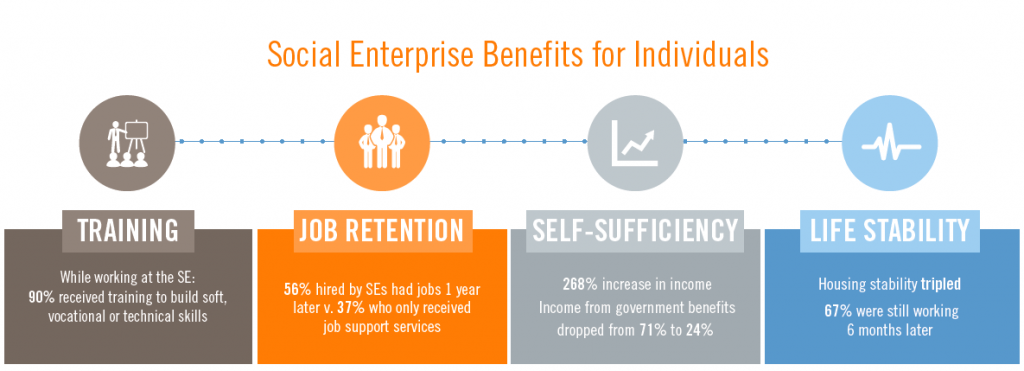Social enterprises have always been touted as important for enhancing the sustainability of nonprofit organizations and filling market voids. Think about the Salvation Army’s thrift shops or Girl Scouts cookies, which are two of my favorite guilty pleasures. However, as the national unemployment rate clicks downward, the hard-to-employ, such as ex-offenders, refugees, the homeless and disabled, are still struggling to find jobs when they are ready and able to work. It is here that social enterprises are taking on a gamechanging role.
Social enterprises are not only mission-driven businesses, but they also create jobs and opportunity for the hard-to-employ. Nonprofits around the country have started social enterprises (e.g., moving businesses, bakeries, one-of-a-kind jewelry and scarves) to employ these individuals, teach them skills and help them transition into the workforce. Sounds good, right? But, is it working? Are we creating an impact for these individuals and hopefully society?
Thanks to a study completed by REDF, a California-based nonprofit that is leading the movement to take these types of social enterprises mainstream, we now know that they DO work and have significant outcomes. They hired an evaluation firm, Mathematica Policy Research, and found the following:

EMPLOYMENT
25% had NEVER been employed → 56% still had jobs 1 year later compared to the control group of 37%
INCOME/BENEFITS
71% had income from government benefits at start → Dropped to 24% at end with a 268% increase in household income from employment
HOUSING
85% had unstable housing at start → Dropped to 47% at end
Based on these findings, Mathematica was also able to show that these social enterprises had a strong social return on investment – every $1 spent on the social enterprise saves taxpayers $1.31.
We especially appreciated the fact that all the social enterprises studied broke even – meaning that the revenue earned by the business paid for itself, which reduces nonprofit dependency on outside sources of funding. There is one caveat, Mathematica contends, and we agree based on our experience: not all social enterprises are equal. As with any business, the idea has to be viable, well-supported and most likely will not break even in the first years of business. REDF has substantial experience with starting businesses, especially ones that best support the hard-to-employ, and understanding how to keep these businesses profitable.
For the social sector, impact is the bottom line. In order to gain support, we must demonstrate impact, proving that our efforts are working. REDF should be applauded for confirming through research that social enterprises are a meaningful contribution to a community’s workforce strategy. We encourage policymakers, funders and community leaders to review this research and provide support for enterprises that give willing workers a second chance. The REDF study proves that it is a gamechanger for them and for society. If you have comments on the study or social enterprise, please share your ideas with us.
